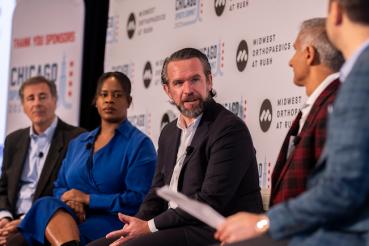When it comes to transforming patient care and innovating care models, engaging clinicians who are at the bedside is essential. This includes nurses who are directly involved in daily patient care; they are well-positioned to provide insight and offer innovative solutions to problems they see or experience firsthand in their everyday work. However, direct care nurses are not often involved in clinical nursing research.
Through the College of Nursing’s Center for Clinical Research & Scholarship, the Rush Nurse Research Fellowship (RNRF) Program aims to bridge the gap between the beside and research. The RNRF provides three direct care nurses in the Rush System for Health with the infrastructure and opportunity to receive dedicated paid research time and mentorship to develop, implement, evaluate and disseminate a research study. Spanning twelve months, the program aims to promote innovative thinking with fellows developing a relevant research study that will result in changes to practice and/or clinical scholarship. Leadership from the Center for Clinical Research & Scholarship including Beth Staffileno, PhD, Mary Heitschmidt, PhD and Janice Phillips, PhD, are paired with fellows and serve as mentors working closely with their mentee through every step of the program. Additionally, fellows are guided by their research mentors on how to share their findings at regional or national conferences and through publication.
The inaugural cohort of fellows wrapped up their first year of dedicated research and a second cohort is already well underway. Read on to learn more about the first RNRF cohort and their research, outcomes and successes.
Meet the 2019-2020 Fellows
Liz Brockland, BSN, RN
 Faculty Practice Clinician at North Side Housing and Supportive Services
Faculty Practice Clinician at North Side Housing and Supportive Services
Rush University, College of Nursing
RNRF Research Project: “Against Medical Advice” (AMA) Discharge and Substance Use: A Retrospective Chart Review of Rush University Medical Center’s AMA Discharge Rates and Hospitalization/Patient Characteristics
A practicing nurse for seven years, Liz Brockland began her career at Lurie Children’s Hospital working in neurosurgery, neurology and endocrinology. She went on to work in maternal/child health in the community before coming to Rush, where has worked as a community health nurse in homeless services for four years.
What made you decide to apply and ultimately participate in the RNRF?
I attended Rush's Nursing Research Symposium, and I was so inspired by all the remarkable work going on at Rush in terms of research. It was also there that I learned about RNRF. I was excited by the opportunity to delve into a topic of clinical interest that I'd been thinking about for years. The program was also an opportunity to see what another area of nursing was like. If you're wondering what you might like your career to look like in the next 5-10 years, the RNRF provides an amazing opportunity to explore other types of work in the field of nursing.
What did your research during the fellowship focus on?
I was interested in patients who discharge from inpatient hospital admissions against medical advice (AMA) and what role substance use may be playing in the decision to discharge. After a lot of preliminary research and conversations with the Substance Use Intervention Team (SUIT), I learned SUIT implemented changes to its substance use protocol in 2017 to more robustly address withdrawal symptoms and substance use in the inpatient setting and beyond. I looked at hospital discharge data from 2015-2019 and determined that although there were hospital-wide substance use interventions rolled out to every patient, AMA discharge rates did not change during this timeframe. Rush's AMA discharge rates remain in line with national rates of AMA discharge (which represent around 1-2% of all hospital discharges). This indicates a need for further research on additional types of interventions that may reduce the number of AMA discharges.
What did you learn from participating in the RNRF?
The RNRF is a remarkably supportive program. You are paid to dedicate time to your research project and you also receive one-on-one mentorship, as well as group consultations. The fellowship requires a lot of energy, time-management, and the ability to work independently, but ultimately you have the support and guidance of highly experienced research nurses at Rush.
Would you recommend the RNRF to other Rush nurses?
Absolutely. The RNRF is an incredibly opportunity to take your experiences from the clinical setting and convert your ideas into a project that has the capacity to affect so many people beyond your typical nursing scope. You will learn so much about research, which is not a typical opportunity afforded to nurses who aren't currently enrolled in graduate work. You'll meet great people and learn so much. It's an excellent way to explore new career paths and gain a better understanding of everything that goes into evidence-based practice.
Stephanie Patronis, BSN, RNC-NIC
 NICU, Clinical Staff Nurse
NICU, Clinical Staff Nurse
Rush Copley Medical Center
RNRF Research Project: Favorable Outcomes from an In-person and Online Feasibility Mindful Moment Pilot Study
Originally going to school to become a pilot, Stephanie Patronis had to reassess her career goals after dealing with health concerns that left her unable to fly. While working as a vet technician, her mother, who was a nurse, encouraged her to apply to nursing school. Unsure of what type of nursing she wanted to pursue after school, her last clinical sold her on the NICU. A NICU nurse for over 14 years now, Patronis thinks about exploring other areas of nursing, but knows her heart will always be in the NICU.
What made you decide to apply and ultimately participate in the RNRF?
I felt like I was at a crossroads in my career and was looking for something to bring back that spark when I saw an email for the RNRF. I had also recently completed my yoga teacher training and was looking for a way to combine the two things I was passionate about – yoga and nursing. After hearing about the RNRF opportunity, the idea really took off from there and I got very excited to learn more about it and see if I could make something of it.
What did your research during the fellowship focus on?
For my project, I focused on evaluating the feasibility of short mindfulness sessions (Mindful Moment) practiced prior to a shift, available in-person and online, on nurse burnout and perceived levels of stress. Findings from this study suggest that practicing a brief Mindful Moment prior to the start of a shift is feasible and self-care interventions provide lower levels of burnout and perceived stress among this sample of nurses.
What did you learn from participating in the RNRF?
I had a very positive experience over the last year and would recommend this program to anyone! I was paired with a mentor that was extremely knowledgeable and helpful as well as easy to work with. Yet, she still allowed me to make the project my own. She guided me in the right direction and I felt like I could ask her anything about the research process. She really helped make the project a success, as we were able to get my research published in the Holistic Nursing Practice Journal. I felt very supported during the fellowship, but also able to express my own opinions and desires for the project.
Would you recommend the RNRF to other Rush nurses?
For any nurse that has a topic they would like to research or an idea that they'd like to explore but don't know where to start – this is the way to go. The program provides you with the time and expertise to confidently take on a dedicated research project and I would very much recommend it to any nurse who is interested.
Hector Castillo, BSN, RN
 Nurse Research Fellow
Nurse Research Fellow
RNRF Research Project: Loneliness in Skilled Care Unit Elderly Patients
A nurse for over six years, most of Hector Castillo’s experience is in Medical/Surgical and Rehabilitation nursing. Over the last few years, he’s worked in the Skilled Care Unit (SCU) at Rush Oak Park Hospital (ROPH) and recently transferred to Rush University Medical Center. Before pursuing his nursing career, Castillo worked as a Spanish medical interpreter for two hospitals in the Chicago area. As an interpreter, he saw the nursing field as an opportunity to start a new career while continuing to help people with more hands-on interaction.
What made you decide to apply and ultimately participate in the RNRF?
Through my years of experience in the nursing rehabilitation field, including my time at ROPH in the SCU, I noticed how lonely some patients get after being admitted. Sometimes they have to stay in the unit for extended periods of time. I had an idea that by showing and acknowledging it as an issue that affects patient satisfaction and recovery, hospitals could be more intentional in their patient interventions and care policies. I talked to my manager at that time and she encouraged me to apply for the fellowship program to explore this idea further.
What did your research during the fellowship focus on?
While most of the research about loneliness has been done in the community, little has been done that is focused on the in-patient population. My research topic thus addressed looking at cases of identified loneliness among patients admitted to the SCU. I was slated to recruit at least 40 patients whom passed certain criteria.
What did you learn from participating in the RNRF?
The ability to participate in the nursing research fellowship process has been a unique and excellent experience for me. It was a great way to learn more in-depth about the research process in the context of the work you are doing. The members of the research department are extremely supportive throughout the whole process and the time given to you to work on your project is extremely helpful. I strongly believe now, more than before, that in order to improve patient care, research is an invaluable asset.
For more information on the Rush Nurse Research Fellowship (RNRF) Program, contact beth_a_staffileno@rush.edu.




